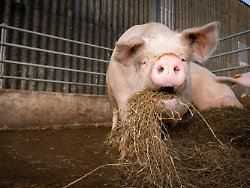Thursday 10th December 2020
Farmers' Association looks at the year
Tense, disastrous, zapping gloom
A cheering farmer is a rare species. But this year is going to be tough for many farmers. Because of Corona, the gastronomy and hotel industry collapsed as a sales market for months. Swine fever seals lucrative markets. And retail is pushing prices down.
For farmers, fluctuations are part of the business – if only with the weather. This year, however, even more came together for many farms: Corona, African swine fever, price pressure from the large supermarket chains. "The situation on many farms is extremely tense," said Farmer President Joachim Rukwied about the economic balance sheet. It is true that the companies' profits recovered by an average of 13 percent to 64,500 euros in the 2019/20 financial year, which ended at the end of June. However, the consequences of the swine fever, which only appeared later, are not yet recorded.
Extended corona restrictions are also putting pressure on the food market. There could now be talk of "no relaxation", said Rukwied. But only a "temporary improvement in earnings" after previous declines in profits across the board. And in the second half of the current financial year, which runs until June 2021, the income situation should clearly deteriorate again.
In the case of dairy and arable farmers, profits are likely to remain below average recently, from which investments also have to be paid. Animal owners in particular were at risk of significant break-ins. There are also various conflict issues:
Trouble with the trade
With the four large, dominant supermarket chains, the dispute over the price policy for meat and other food is boiling up – even during farmer protests in front of central retail stores. He fully understands the frustration and anger, said Rukwied. The producer prices for pork are currently catastrophic, but prices at the sales counter are stable. Politicians are also focusing more closely on the issue – are there any signs of change?
The discounter Lidl announced on Thursday that it would raise the purchase price for ten items in its pork range by one euro per kilogram. As a result, the sales price should also increase by the same amount. The interest group of pig farmers in Germany welcomed the reaction. Tomorrow, Friday, the discounter Aldi wants to hold talks with the farmers' protest movement "Land creates connections". Beef prices are also under pressure, according to the farmers' association. There is also anger about unfavorable conditions for suppliers.
The pig market
The situation for pig farmers is "zappenduster", reported Rukwied. The swine fever that appeared in wild boars in Brandenburg and Saxony still does not affect any stables. As a result, however, exports from all over Germany to large markets outside the EU such as China collapsed – and so did the prices. For a piglet they would be at a "disastrous level" of a good 20 euros, sometimes only 12 or 13 euros. Overall, German pig farmers are losing around 40 million euros every week. An enormous demand from China had boosted profits until the animal epidemic occurred in Germany. The pig farmers could now frame this as a "temporary historical result", said the farmer president.
No relaxation in sight is also in the case of bottlenecks in large slaughterhouses that were triggered by corona outbreaks among staff. As a result, 650,000 pigs have now accumulated and have to be slaughtered. It could become even more difficult at the turn of the year: If seasonal workers had to be quarantined in their home countries after returning from the holidays and could not start again until mid-January.
The Corona Shifts
The pandemic had already messed up the market, especially in the spring. While there were sales records and in some cases even hamster purchases in supermarkets, important bulk buyers such as the catering industry collapsed. That normalized again over the summer.
In view of the second Corona wave, restaurants and hotels are closed again and are only allowed to sell to take away – and that of all times during the important time of Christmas parties. This also affects farmers, as Rukwied explained.
Some farmers have specially produced Christmas geese, but sales are now sluggish. Direct marketing, for example when farmers sell jam at Christmas markets, is also missing now. They are not represented on internet trading platforms. The association called for farmers to be included in Corona economic aid.
.
